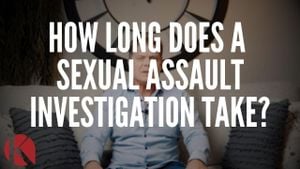The Biden administration’s approach to Christian colleges has stirred significant controversy, with reports indicating targeted enforcement actions by the Department of Education (DOE). According to research from the American Principles Project (APP), nearly 70% of the Office of Enforcement's activities were directed at Christian and career-oriented institutions. This figure raises questions and concerns among policymakers and advocates of educational freedom.
This targeting of faith-based colleges is notable considering these institutions represent less than 10% of the student population across the United States. The statistics reveal not just the extent of the scrutiny but also highlight disparities when compared with the enforcement actions against larger, more established universities like those within the Ivy League. The APP report suggests the enforcement actions have disproportionately affected Christian colleges and universities, which may not align with the current administration's progressive educational agenda.
Data from the report indicates average fines imposed on Christian colleges for Clery Act violations reached around $815,000. This figure stands out when placed alongside the fines of approximately $228,571 levied against public and private institutions. Such disparities have fueled allegations of bias against faith-based institutions.
The Biden-Harris administration’s unique positioning on education reflects broader ideological divides, particularly around issues of religious expression and institutional autonomy. For many supporters of Christian educational institutions, this scrutiny indicates not just regulatory oversights but also what they perceive as systematic attempts to silence opposing viewpoints.
Jon Schweppe, Policy Director at APP, lamented the unfair nature of these penalties. He accused the Biden administration of utilizing various government agencies as instruments to punish those who express beliefs or ideals contrary to liberal agendas. “For the last four years, Democrats have been busy weaponizing every part of the federal government to target their opponents,” he stated. This sentiment resonates within many conservative circles, where there is growing concern over perceived governmental overreach.
Particularly controversial was the resurrection of the Student Aid Enforcement Unit under the Biden administration, which had previously been deprioritized during the Trump-Pence administration. An increase of nearly 600% to the unit's budget was reported, alongside requests for additional funding exceeding 230% for the following year. Critics argue this reflects the administration's commitment to curbing the growth and influence of faith-based schools.
Specific institutions, such as Grand Canyon University and Liberty University, were identified as significant targets within the report. These universities have faced fines amounting to what the APP describes as record levels, surpassing penalties imposed over the past seven years for similar violations across other institutions.
The example of Corinthian Colleges is often cited as emblematic of how overregulation can have disastrous consequences for educational institutions. Corinthian was the largest career-education organization before being forced to shut down under duress from federal actions. During its operational years, the institution faced accusations from then-California Attorney General Kamala Harris, leading to massive fines and eventual bankruptcy, which affected thousands of students.
According to the APP findings, at least 12 Christian colleges have faced penalties or restrictions from receiving federal student aid—an issue not paralleling the experiences of elite Ivy League schools, which reportedly have faced no such punitive actions from the Office of Enforcement.
On the broader narrative, there exists skepticism around the motivations behind the aggressive regulatory strategies employed by the DOE. Critics argue these measures not only threaten the existence of these colleges but also infringe on the academic freedom and religious expressions of their students and faculty. The perception of bias may exacerbate existing tensions around educational policies and their intersection with religious beliefs.
There is also growing concern about the potential impact of these policies on students who seek education rooted in Christian doctrines. With the trend of increasing enrollment at faith-based institutions growing at approximately 82% from 1980 to 2020, advocates for these schools argue the current actions pose significant risks to the diversity of educational offerings available to students.
Despite the scrutiny faced by Christian colleges, proponents of the administration’s enforcement strategy argue it is necessary to maintain integrity and transparency within educational institutions. They advocate for regulations as mechanisms to uphold standards and protect students from potential exploitation by institutions failing to meet established guidelines.
Overall, the intersection of education and religion within federal policies invites passionate debate. With reports detailing the DOE's enforcement activities, supporters of Christian colleges are rallying for greater protections against perceived government overreach, hoping to preserve their vision of education and institutional autonomy.
The outcome of this discourse will likely shape the future of educational policies and the relationship between the government and faith-based institutions. Observers are continuing to monitor developments and how they may influence the broader educational ecosystem, recognizing the pivotal role these institutions play within the diversity of American higher education.



